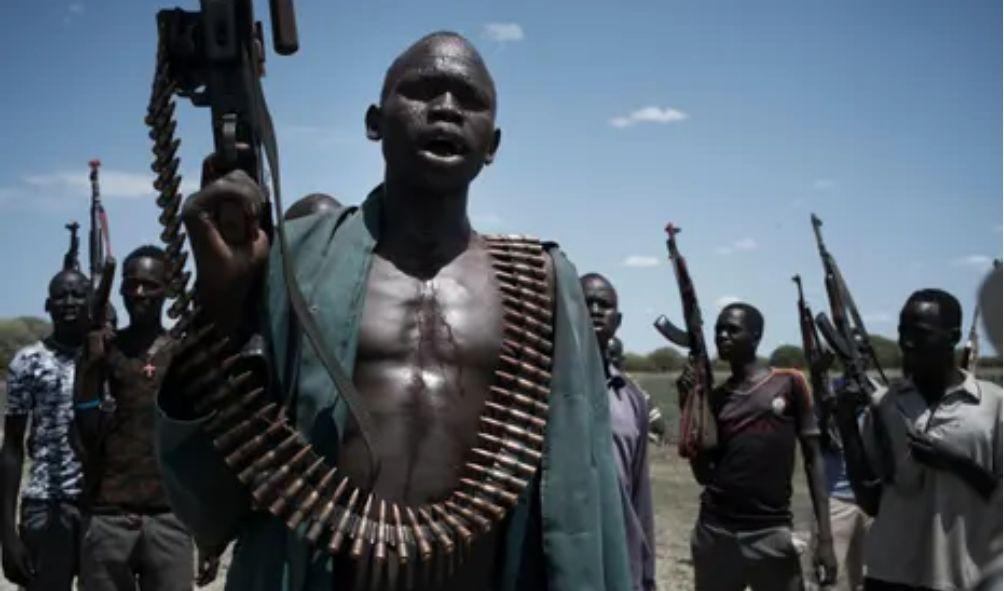Endless Struggle: Sudan’s Ongoing Brutal War
One month after the outbreak of the Sudanese conflict, the country’s capital is a desolate war zone where terrified families huddle at home while gun battles rage, and the western Darfur region has descended into a state of lethal anarchy.
Khartoum residents have endured weeks of severe food and basic supply shortages, power outages, communication failures, and soaring inflation.
Long a place of relative stability, the capital of five million has become a shell of its former self.
Looters have pillaged hospitals, banks, shops, and wheat silos, leaving charred aircraft on the airport tarmac and shuttered foreign embassies.
In addition, violence resumed in El Geneina, the capital of the state of West Darfur, resulting in hundreds of deaths and the “total collapse” of the health system, according to medical professionals.
According to witnesses, fighting continued on Monday, with loud explosions audible throughout Khartoum and thick smoke billowing into the sky as warplanes drew anti-aircraft fire.
ALSO READ:Sudan’s Rival Forces Agree to Protect Civilians, No Ceasefire Yet
A 37-year-old resident of southern Khartoum who wished to remain anonymous due to safety concerns stated, “The situation is deteriorating by the day.”
“People are becoming increasingly fearful as the two sides… become increasingly violent.”
The fighting between army chief Abdel Fattah al-Burhan and his former deputy Mohamed Hamdan Daglo, who leads the paramilitary Rapid Support Forces (RSF), broke out on April 15.
The remnants of the government have retreated to Port Sudan, an evacuation hub 850 kilometers (500 miles) away.
According to the United Nations, nearly 200,000 people have fled Sudan and another 700,000 have been displaced internally by the fighting.
Hamden Mohammed, who fled the Khartoum region for Port Sudan, grumbled, “We’re left on the street, in the sun.” “We want the organizations to evacuate us from Sudan because the country is in ruins.” There is no food, no work, and nothing else.”
According to medical personnel, approximately one thousand people have perished, primarily in and around Khartoum and in the devastated state of West Darfur.
Friday and Saturday violence in El Geneina, the capital of West Darfur, resulted in at least 280 deaths, according to the Sudanese doctors’ union, which cited “difficulties in counting all casualties.”
A resident of El Geneina stated, “There was still heavy shelling on Sunday that struck my home, causing damage and injuring one of my sisters.”
Other homes in our neighborhood were destroyed.
After a month of fighting, Burhan announced that he would freeze the RSF’s assets. He fired the governor of the central bank and the director general of the police, while Daglo threatened in an audio recording that the army chief would be “brought to justice and hung in a public square.”
ALSO READ: Sudan Conflict Could Displace 800,000, Warns UN
An account of coups
Neither side has been able to establish battlefield superiority.
The army, supported by Egypt, has the advantage of air power, whereas Daglo is supported by the United Arab Emirates and foreign fighters, according to experts.
Daglo commands forces descended from the infamous Janjaweed militia, which is accused of committing atrocities during the twenty-year Darfur conflict.
US Director of National Intelligence Avril Haines stated in a recent Senate hearing that “both sides believe they can win militarily.”
Multiple truce agreements have been broken, diminishing hopes for an end to the fighting.
According to Alex Rondos, the former special representative of the European Union to the Horn of Africa, both sides “violate cease-fires with a frequency that demonstrates a level of impunity unprecedented even by Sudan’s standards of civil conflict.”
Sudan has a long history of military coups. But optimism rose in 2019 after mass protests led to the ouster of Islamist-backed strongman Omar al-Bashir. And a rocky transition to civilian rule.
Sudan was slowly reintegrating into the international community. As Washington and other foreign powers lifted sanctions until the generals staged another coup in 2021.
The UN reports that ethnic violence in the states of West Kordofan and White Nile last week. Resulted in the deaths of more than 50 individuals.
‘Poorer for longer
The fighting has exacerbated the humanitarian crisis in Sudan. Where one-third of the population already relied on humanitarian aid before the conflict.
ALSO READ: UN and World Leaders Assist Ruto in Resolving Sudan Crisis from Kenya
Since then, aid organizations have been looted and at least 18 of their employees have been murdered.
In the Saudi city of Jeddah, across the Red Sea, envoys from both sides have been negotiating.
By the 11th of May, they had signed an agreement to adhere to humanitarian principles. Which included allowing desperately needed aid.
According to William Carter, the country director for the Norwegian Refugee Council. Chaos erupted again in Geneina on Thursday evening, just hours after the two warring parties signed the Jeddah Agreement.
According to Doctors Without Borders. Food shortages in Darfur’s refugee camps have reduced the number of daily meals from three to one.
Aly Verjee, a researcher on Sudan at the University of Gothenburg in Sweden, stated that the conflict has led to “the partial deindustrialization of Sudan.”
“This means that any future Sudan will be much poorer for much longer.”
Endless Struggle: Sudan’s Ongoing Brutal War
HEY READER. PLEASE SUPPORT THIS SITE BY CLICKING ADS. DON’T FORGET TO HIT THE NOTIFICATION BELL FOR MORE UPDATES AROUND THE GLOBE.
